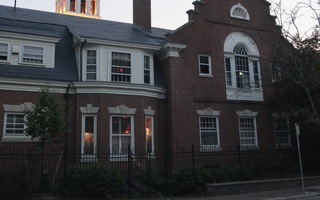As University President Drew G. Faust prepares to leave her position at the end of the academic year, we commend her prudent leadership amid the wide-ranging changes that have marked her tenure.
Faust’s decade at the helm of the University has been marked by political and economic turmoil. Only a year after she took office, the Great Recession slowed many planned University projects (such as the Allston campus expansion) and slashed the endowment by $11 billion. Though many, us included, viewed her leadership as too conservative at the time, we applaud the way Faust calmly stewarded Harvard through the crisis.
While many painful cuts were necessary, we are glad she performed triage and maintained priorities such as financial aid. And while we do wish that she had taken more decisive action with the endowment during the past several years, Harvard is in a much better position to grow today thanks to Faust. This is not an achievement to be taken lightly, nor is a capital campaign that has been the most successful in higher education. And now, as the finances normalize again, we hope that some budget cuts can be reversed, such as reductions to workers’ compensation—and, dare we suggest, hot breakfast in the Houses?
Finances aside, Faust’s tenure has been remarkably wide-ranging. Her ability to mend relationships with the Faculty—particularly after the stormy clashes of her predecessor, Lawrence H. Summers—has not gone unappreciated. The resurrection of the Allston campus expansion, particularly after the stalled construction incited passions among campus and community members, has been remarkably expedient, considering the campus is slated to open in two short years. And we cannot forget her tireless lobbying efforts in Washington, which have advanced the interests of the University and its students. Her most controversial action—imposing sanctions against the members of single-gender social organizations—has also helped to further campus discourse surrounding the nature of these clubs and led many groups to change their policies.
Of course, despite all this, Faust was not perfect. We remain aware of many painful issues on this campus that she could have attempted to address more substantively. For example, issues of diversity and inclusion, with which the campus has grappled over the last few years, have not been fully addressed. In addition, as we learn more about the actions taken by Harvard in its past, we wish Faust had gone farther in aggressively recognizing the uncomfortable parts of our history. The superficial changes to seals and alma maters do not resolve the underlying issues. And as those who witnessed the HUDS strike recall, Faust’s opposition expanding workers’ benefits serves as a reminder of her administration’s reluctance to enable campus workers to join in the University’s wealth.
Overall, though, President Faust’s accomplishments are wide-ranging, and Harvard is in a much better place to move forward than just a few short years ago. She has undoubtedly strengthened the University; we hope the positive changes she worked to affect are not lost under her successor.
This staff editorial solely represents the majority view of The Crimson Editorial Board. It is the product of discussions at regular Editorial Board meetings. In order to ensure the impartiality of our journalism, Crimson editors who choose to opine and vote at these meetings are not involved in the reporting of articles on similar topics.
Read more in Opinion
Not a Real Fan

















